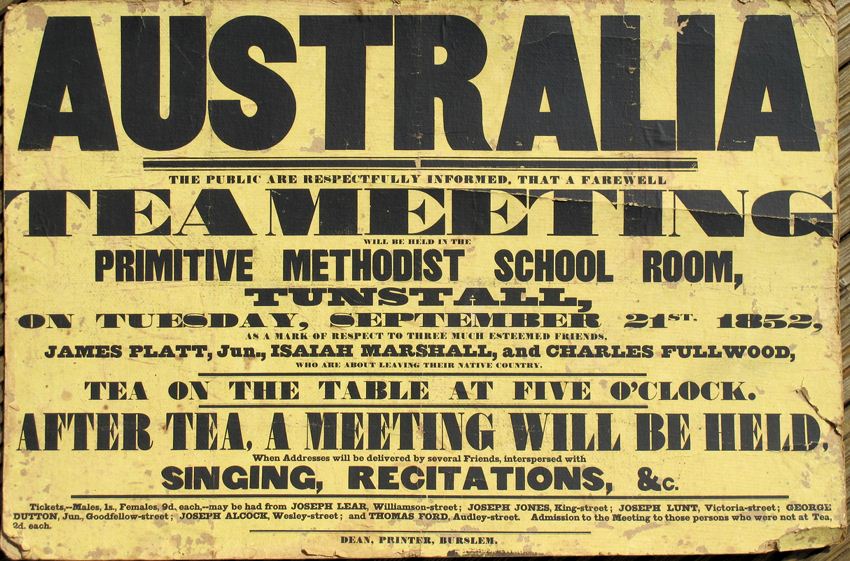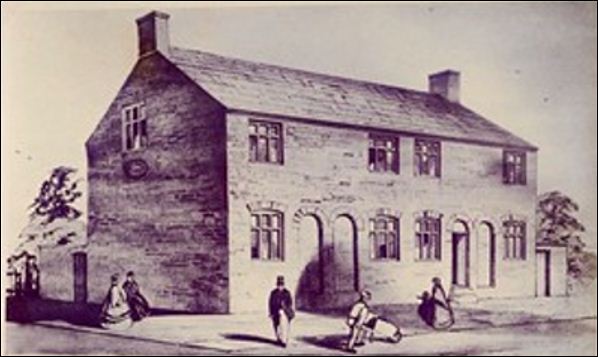thepotteries.org
| the local history of Stoke-on-Trent, England |
thepotteries.org |
Focus on - Stoke-on-Trent and Australia
Stoke-on-Trent provided Australia with crockery, convicts, political deportees, emigrants and a Prime Minister! |

Farewell 'Tea Meeting' to
celebrate three people leaving Stoke-on-Trent
for Australia in 1852
Convict Potters..
| Convict Potters:
The production of pottery ware began soon after settlement in Hobart. By 1816, ex-convict James Brammer had established a pottery, using moulds to produce tobacco pipes and other items. Port Arthur Penal Settlement also had a pottery, operated by convicts from the early 1840s until at least 1870. Its wares were displayed in exhibitions, at times supplied the government's wants in Port Arthur and Hobart, and were sold to the Hobart public. It is known that Josiah Spode's grandson Josiah emigrated to Tasmania where he held a position as Controller of Convicts. Jonathon Leak - a potter from Burslem - arrived in Australia as a convict in 1819. After getting a ticket-of-leave he started a business as a pot maker and by 1828 was employing over 20 free men. Jonathan Leak was the most successful potter of the early developing period of Australia.
Jonathan Leak's fall and subsequent rise to fame came as a result of he and two friends burgling the home of Mrs Chatterley of Shelton on the night of Sunday 20th December 1818.......The three convicted men were sentenced to hang but were reprieved but to be deported to Australia for life.......On the 31st July 1819 the three sailed in the brig Recovery for Sydney, Australia. All the prisoners had to do useful work, and Leaks talents as a potter were quickly realised by Macquarie, the Governor of New South Wales, who immediately put him to paid work in the adjacent Government Pottery. This had been built in about 1790 on the site of a large deposit of high quality pipe and potters clay. He made many improvements to the pottery making processes and in consequence of this and his good conduct, he was granted a ticket of leave in September 1822 and permitted to do the best he could for himself. He no longer had to work as an assigned man for a master and he was able to spend the rest of his sentence working for himself wherever he pleased provided he stayed within the colony. He still had restrictions placed on him and had to ensure good behavior and the ticket of leave could be revoked at any time.
In July 1823 Leak successfully obtained two land grants, close to the Government Pottery, which enabled him to establish his own pottery. By 1828, Leak's pottery was employing over twenty free men. He was the only potter operating in the colony and two short articles in 1828 in 'The Australian' newspaper reported the production of 40,000 bricks weekly. Several advertisements in the newspaper appeared offering the sale of malt kiln tiles, oven tiles, common bricks, ginger beer and other bottles, stone jars for pickling and preserving, and earthenware of all sorts. Unfortunately, by February 1828, his health had deteriorated and in a letter to the Governor, he wrote that he was in a very weakly state; furthermore, his wife had been for some time confined to a bed of sickness. His two sons, Lewis and Stephen, took over the day-to-day running of the pottery. That same year, Jonathan petitioned the Governor for a conditional pardon, which will enable him to support his family with credit and educate them in the paths of rectitude. The conditional pardon was granted and it gave him citizenship of the colony but no right to return to England. Source: National Library of Australia Also see: Jonathan Leak
The
pieces featured in both these photographs are on display in the National
Museum of Australian Pottery in Holbrook N.S.W. Australia. Web page www.australianpottery.net.au |
Political prisoners..
|
Chartists: In 1841 a large group of Chartist miners and pottery workers were sentenced to transportation at Stoke-on-Trent.
-
click for a
contemporary account of the chartist transportation -
|
Emigration..
|
Emigrants: Until the 1870's there was only a trickle of assisted emigrants from the Midlands. The late nineteenth century saw increased emigration from the Midlands. Over 1,000
Midlanders were assisted to Queensland between 1876 and 1879, of which 431 came from largely industrial Staffordshire. Staffordshire usually made the largest
contribution of assisted migrants of any Midlands county. Many from Staffordshire were coal miners.
Migration from the Midlands
|

poster from 1852 - advertising
a 'Tea Meeting' to send off three members
who were emigrating to Australia
poster kindly supplied by Annette Watson from Sydney, Australia
|
AUSTRALIA James Platt, Jnr.,
Isaiah Marshall, and Charles Fullwood Tea on the table at
five o'clock Tea meetings
were popular in religious (Methodist, Brethren, Unitarian) circles in the
1800's as entertainment, celbratory events and often to raise funds for
building work.
|

the Primitive Methodist Church
in Tunstall
where James Platt, Jnr.,
Isaiah Marshall, and Charles Fullwood
set out from for their journey to Australia in 1852
Transportation..
|
Transportation: More than 16,000 convicts from the industrial Midlands were transported to Australia between 1788 and 1852. Convicts transported from the Midlands were even more overrepresented among man sent to Western Australia between 1850 and 1868, of whom 15% were convicted by Midland courts. Initially the courts in Shewsbury and Worcester were particularly active in sentencing but soon the emphasis shifted to the industrial areas including the Black Country and Stoke-on-Trent. |

Transportation order in 1851
for Jacob Elson, age 16
who was transported from Tunstall to Tasmania for 10 years
for stealing a jacket
- click for more -
|
Selection of extracts from the Stafford Assizes of people from Stoke-on-Trent area who were sentenced to be transported to Australia. These extracts make facinating
reading: the youngest transported was a 10 year old and the oldest 60. Some
were transported for stealing as little as 'a piece of cheese' or 'a hat'
.
|
and a Prime Minister..
|
|
|
During his teens he embraced Primitive Methodism, and is sais to have marked his conversion by dropping the "e" from his surname. Joseph married Mary Turner (whose brother was one of a number of Silverdale miners already settled at Lithgow, New South Wales) in August 1885 at Wolstanton Primitive Methodist Chapel, Stoke-on-Trent. The couple had 5 sons and 3 daughters. Cook became a lay preacher and a successful public speaker. He also became involved in trade union affairs: before he was 25 he had been elected successively to all the executive positions in his union lodge, and had also become interested in political issues; he supported tariff protection as a method of improving working conditions in the coalmining industry. By the early 1880s Cook had fulfilled his obligations to his family and, after being several times unemployed, he decided to migrate. Following the example of his brother-in-Law Jpseph and his family emigrated to New South Wales, Australia during the late 1880s.
Elected MP for Parramatta, NSW from 1901–1921 and as leader of the Liberal Party, Cook became Prime Minister for just over a year following the 1913 elections. Cook resigned from Parliament in 1921 and was appointed Australian High Commissioner in London, where he served until 1927. During 1928 and 1929, he headed the Royal Commission into South Australia as affected by Federation. He died in Sydney in 1947, aged 86.
|